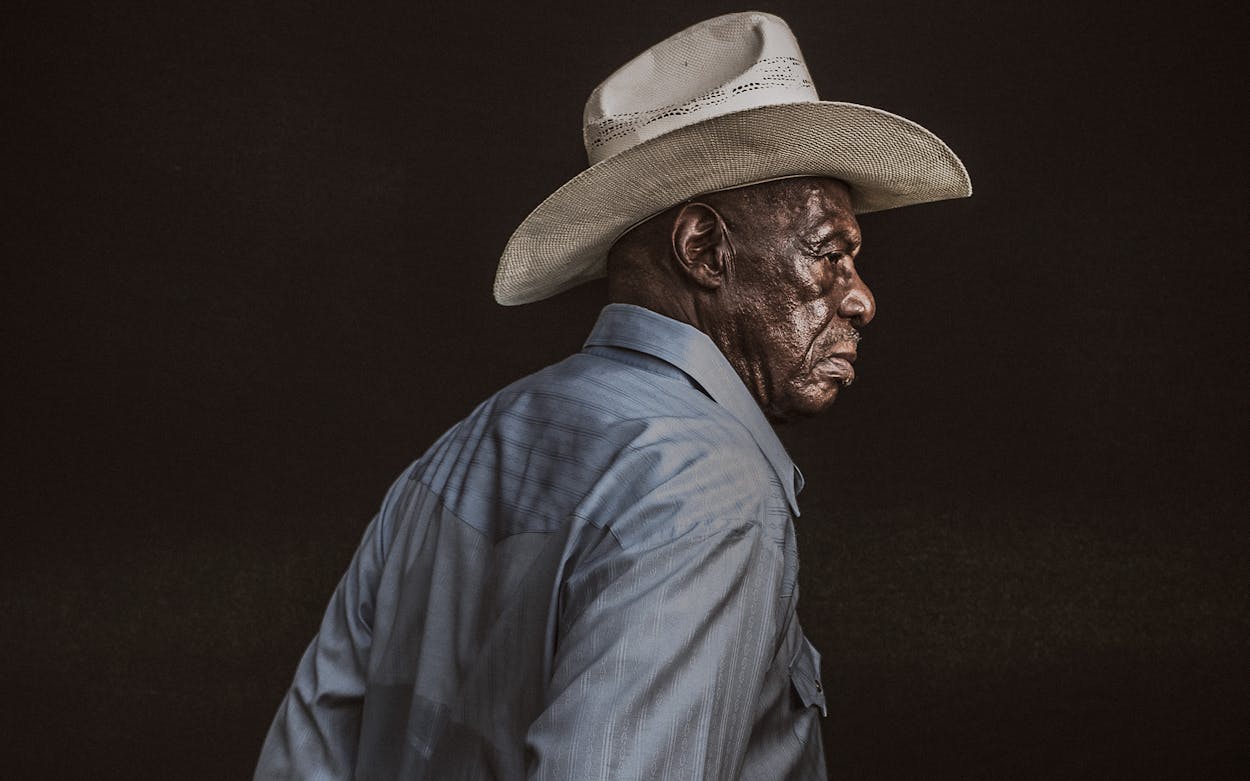Larry Mahan. Tuff Hedeman. Jim Shoulders. Lane Frost. Ty Murray. Growing up in West Texas, these were some of the rodeo stars I could rattle off as easily as any football-obsessed kid reciting the names of Dallas Cowboys quarterbacks. My granny was the one who introduced me. Every January, she’d drive us some thirty miles from my hometown to the Sandhills Stock Show and Rodeo, in Odessa. It was there, bundled up in the frigid Ector County Coliseum, that I fell in love with the sport, especially the rough stock events: saddle bronc, bareback, and bull riding. And yet, despite my early appreciation for rodeo and its legends, it wasn’t until 2017, when I was nearly thirty years old, that I first heard the name Myrtis Dightman.
At the time, I was a full-time fact-checker at this magazine, hungry for any freelance writing assignments I could find. A pitch came my way from an editor at Amtrak’s now-defunct magazine, the National. The editor had seen a small article about the Prairie View Trail Ride Association, the oldest Black trail-riding organization in Texas (and possibly the nation), and he wondered if there might be a bigger story to report. I was sure there was and took the job.
One wintry evening in Houston, I met with Prairie View’s current trail boss, Myrtis Dightman Jr. He agreed to let me accompany the riders as they made their annual trip from Hempstead to the Houston Livestock Show and Rodeo—a nearly hundred-mile trip over several days, completed entirely on horseback or in wagons. I spent those days listening to stories of Black cowboys from the Gulf Coast and East Texas, learning about their exploits on ranches and in rodeo and how the Prairie View trail riders had broken the Houston Rodeo’s color barrier, in 1957, by being the first nonwhite organization to ride in the yearly parade. Myrtis Dightman Sr. had been one of the founding members. At night, around the campfire, I sat and listened to Myrtis Jr. describe his father’s incredible legacy—not only as a groundbreaking trail rider and cowboy, but also as a bull-riding superstar. “In fact,” Myrtis Jr. told me, the flames lighting his face in the dark, “they call him the Jackie Robinson of Rodeo.”
Months after my story on the Prairie View trail riders was published, I couldn’t stop thinking about Myrtis Dightman Sr. I felt like I should have grown up knowing his name, like I had so many other renowned rodeo cowboys. A profile in Texas Monthly, I figured, might help change that for future generations. Although I was still a fact-checker, the editors here gave me the green light to get started.
For six months, I researched and reported. I pored over every scrap of writing about Dightman’s life I could turn up, I contacted museums and archives, and I even tracked down a 1967 episode of the game show To Tell the Truth featuring Dightman. I interviewed his friends and family, as well as rodeo greats Larry Mahan, Ty Murray, and Charlie Sampson. And I’m sure I drove Dightman crazy with my questions. I spent time with the then-83-year-old cowboy on his small ranch near Crockett, rode the bus he drives Sunday mornings at the Second Baptist Church in Katy, and attended his namesake rodeo, which he founded in 1988 to support youth trying to break into the sport. The profile of him ran in the July 2018 issue. Dightman was on the cover.
In the years since, Dightman has been busy—he’s been interviewed by Oprah, he’s the subject of a documentary called Spurring Change that debuts later this year, and there’s a Hollywood project about his life in the works, with Jonathan Majors attached to star. As for me, I was later promoted to staff writer and have written several cover stories and features since—but nothing has been more rewarding than getting to share a piece of Dightman’s story.
We’ve kept in touch, mostly through his son, Myrtis Jr., and I look forward to seeing them both every Labor Day at the Dightman Hall of Fame Rodeo, in Crockett. Though Dightman tends to shrug off the ever-increasing media attention, it remains my hope that someday, kids all over will know the name Myrtis Dightman.








